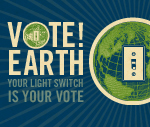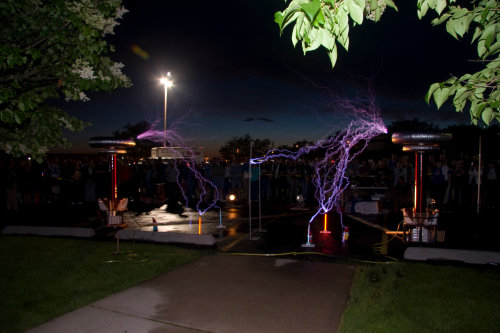 Tomorrow night (March 28) is “Earth Hour” — a campaign to raise awareness of global warming by turning off your lights for one hour, from 8:30-9:00 PM local time.
Tomorrow night (March 28) is “Earth Hour” — a campaign to raise awareness of global warming by turning off your lights for one hour, from 8:30-9:00 PM local time.
It’s an interesting idea, but a weird one. For one thing, global warming seems an odd fit. Yeah, there’s a connection, but it seems more directly tied to pollution and simple conservation of finite resources. For another, it really reminds me of those campaigns to protest gasoline prices by not buying gas on a particular day, without changing your driving habits.
Then there’s the fact that it’s presented as a “global election between Earth and global warming.” Not only is this silly, it’s also the kind of black-and-white with-us-or-against us thinking that just polarizes people — and indeed there are a bunch of jackasses running around shouting about how they’re going to turn on every single light in their house during that hour just to piss off the “treehuggers.” (Apparently these people have money to burn even in this economy, and enjoy breathing smog.)
And of course, there’s the question of what to do with that hour.
Does it count if you leave the house? Chances are you’d be turning the lights off anyway.
How about non-electric lighting? A candlelit dinner, perhaps? You’re still consuming resources to produce light. A flashlight would have the same problem: you’re using power that was put into a battery.
So that cuts out things like reading, or playing cards, or board games.
TVs and computer monitors produce light. Music players use electricity. A stove uses either electricity or gas. If you turn off the lights and turn on the TV, that’s not really much of a savings, is it?
So really, you have one hour at home in the dark, at an hour earlier than you’re likely to sleep, and you can’t use anything with light or electricity. That really cuts back on available activities. You’re pretty much down to conversation. Maybe stargazing. A few other things that don’t require light.
Actually, I guess it would be an interesting experiment/reminder of what night is like without artificial lighting — sort of a voluntary power outage without candles and flashlights.
The more lasting impact will be to simply not waste energy. Turn off lights when you’re not using them. Turn off your computer when you’re not using it (or at least put it to sleep). Unplug appliances that have standby modes when you’re out of town. Don’t run your heater or air conditioner when you’re not home, unless you’ve got it on a timer to get the place ready for when you arrive.
You’ll save money on your electric bill. The power company will use less fuel. They’ll pump out less pollution, and reserves will last longer. Everyone wins.
(Found while surfing Blogexplosion.)

